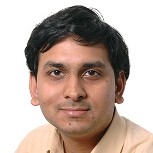
Professor in Microsystems Technology
Academic Division: Mechanics, Materials and Design
Research group: Applied Mechanics
Telephone: +44 1223 3 32755
Email: aas41@cam.ac.uk
Research interests
My research interests are in the design of micro/nanoelectromechanical systems (MEMS/NEMS), particularly in relation to sensors and sensor systems. This encompasses the modelling and analysis of MEMS/NEMS and understanding theoretical and practical limits to measurement including the modelling of noise and drift processes, nonlinear and scale-dependent effects, and physical origins of error and uncertainty. The insights derived are applied to the design and engineering of micro/nanoelectromechanical devices for specific applications, including inertial and gravity sensing, environmental and structural health monitoring, mechanical signal processing, vibration energy harvesting, and biomedical sensing. Linking the physics and engineering is made possible through the development of micro/nanofabrication processes, packaging and assembly techniques, test and characterisation methodologies, and interface and signal conditioning electronics.
Strategic themes
Energy, transport and urban infrastructure
Co-investigator, Cambridge Centre for Smart Infrastructure and Construction
Manufacturing, design and materials
MEMS design and fabrication.
Bioengineering
Biomedical devices and biosensors.
Complex, resilient and intelligent systems
Non-linear dynamics in MEMS/NEMS resonators and oscillators.
Teaching activity
Part IIB: Random and Nonlinear Vibration
MRes: Centre for Doctoral Training in Sensor Technologies and Applications
MPhil: Micro- and Nano-technology
Biography
Ashwin A. Seshia is a Professor of Microsystems Technology in the Department of Engineering at Cambridge University and a Fellow of Queens’ College, Cambridge. He received his B.Tech. degree in Engineering Physics from IIT Bombay in 1996, and the MS and PhD degrees in Electrical Engineering and Computer Science from the University of California, Berkeley in 1999 and 2002 respectively. He has held visiting positions at Stanford University, the University of California, Berkeley, and IIT Bombay.
His research interests include microelectromechanical systems (MEMS) design, particularly in relation to sensors and sensor systems. Foundational research and translational contributions include to the field of resonant and mode-localized sensing, and towards the development of frequency modulated gyroscopes, micromachined vibrating beam gravimeters, and vibration energy harvesting. Ashwin is a co-founder of two companies, 8power and Silicon Microgravity, that were formed to translate research in energy harvesting enabled sensor systems for condition and structural health monitoring, and MEMS-based gravity and inertial sensing, respectively.
Ashwin received the 2018 IEEE Sensors Technical Achievement Award (Advanced Career - Sensor Systems) "for pioneering contributions to resonant microsystems with application to sub-surface density contrast imaging and energy harvesting systems". He is a distinguished lecturer of the IEEE Sensors Council (2020-2022). Ashwin has acted in numerous service and leadership roles for the MEMS, sensors, and frequency control technical communities, and is currently an Editor of the IEEE Journal of Microelectromechanical Systems and a member of the executive committee of the European Frequency and Time Forum. He has previously served on the editorial boards of the Journal of Micromechanics and Microengineering (2015-2016), the IEEE Transactions on Nanotechnology (2015-2017), and the IEEE Transactions on Ultrasonics, Ferroelectrics and Frequency Control (2011-2021).
Ashwin is a Fellow of the Institute of Physics (IOP), a Fellow of the Institution for Engineering and Technology (IET) and a Fellow of the Institute of Electrical and Electronics Engineers (IEEE). He was elected a Fellow of the Royal Academy of Engineering (FREng) in 2023.
